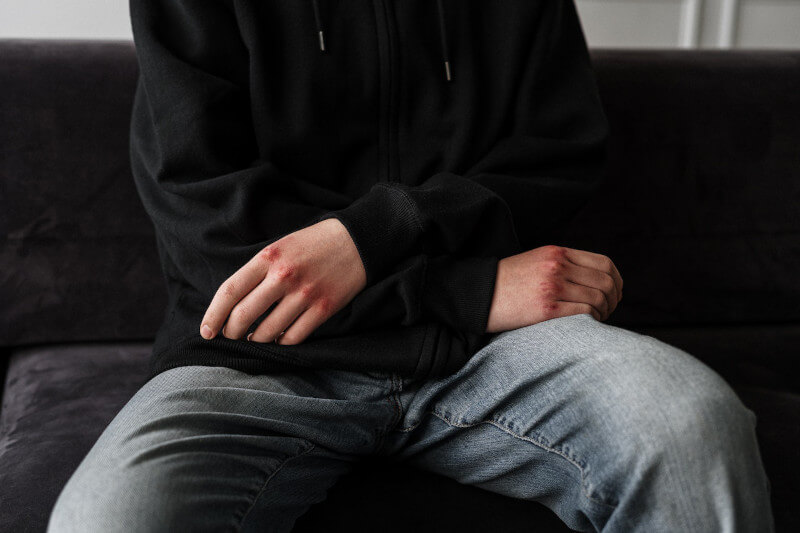The Five Steps to Happiness and the End of Self-Destructive Habits
Daily living is fraught with stress. Negative feelings and actions are common among those who feel overwhelmed by stress. Binge eating, withdrawing from social activities, excessive alcohol consumption, smoking, and drug use are all examples of such behaviours. You could think you have no control over your need to participate. If you’re having trouble seeing your bad habits, this article might assist. You might pick up some useful coping mechanisms and alter your approach to social interaction as you continue reading.
Can You Define Self-Destructive Actions?
To injure oneself physically, emotionally, or mentally through deliberate activities is to engage in self-destructive behaviour. These actions are not deliberate. You may recognise your undesirable habits yet find it difficult to resist them. There can be a wide spectrum of severity in self-destructive actions. People may vary in how often they engage in such actions. Several obvious and widespread examples of damaging behaviour include:
- Consumption in excessive quantities
- Addictions to video games, retail therapy, or other risky pursuits
- Having suicidal thoughts
- Sexually dangerous behaviour
- Substance abuse and alcoholism
- Hair pulling, burning, and cutting are all examples of self-inflicted injuries.
Some forms of self-sabotage are so subtle that you can be performing them without even realising it. These nuances include:
- Conforming to the expectations of those around you
- Statements like “I’m not smart, good-looking, or talented enough” that is repeated to oneself over and over.
- Clinging to a partner who isn’t interested in you
- Self-pitying to the point of drowning
- Putting up a show of hostility, rudeness, or aggression to alienate others
- Maladaptive behaviours, such as putting things off and avoiding responsibility,
Perspectives of People Who Harm Themselves Constantly

If you have a history of dangerous conduct, you may be putting your mental health and life in jeopardy. Your self-destructive habits might be overcomeable. Your time to full health may be affected by the following:
- How often and how badly do your symptoms occur
- If you also suffer from mental health issues like depression or PTSD,
- If your actions indicate that you have an eating issue, are regularly drunk, or are addicted to drugs,
- Your hope that you will improve is very dependent on the specifics of your situation. You could benefit from medical attention and treatment if necessary. Maintaining contact with a medical expert who can update you on your condition is recommended.
Reasons and Potential Threats
Self-harm is prevalent in our society and is not necessarily indicative of mental illness. Anyone is susceptible to the emergence of detrimental habits. Negative habits may have their roots in formative years. Depression and anxiety, among other mental health concerns, are also possible causes. If you have or have recently encountered any of the following, you may be at risk for engaging in self-destructive behaviour:
- Dependence on drugs or alcohol
- Having a traumatic, abandoned, or neglected childhood
- Abuse, either physical or mental
- You’ve seen some pals hurt themselves intentionally.
- Lack of confidence
- Isolation and social exclusion
- One bad habit can lead to another if you already have one.
Disorders of the Mind and Self-Destructive Habits
There may be a mental health issue at the root of self-destructive behaviour. Self-destructive behaviour is a sign of, or an outlet for the expression of, several mental health disorders. Some mental health issues that could be contributing to your self-harming tendencies are as follows:
- Disturbances of Anxiety. distinguished by its ability to paralyse worry, anxiety, and stress
- Depression. Your feelings of melancholy and disinterest are overwhelming. There is a possibility of bodily manifestations.
- Disordered eating. Anorexia, bulimia, and binge eating are all well-known examples of eating disorders.
- Disturbances of personality. You have a hard time maintaining positive relationships with other people.
Affective Disorders Related to Trauma (PTSD). Traumatic experiences can lead to post-traumatic stress disorder. A person who has experienced trauma is more inclined to act destructively, like a combat veteran.
Diagnosis

Self-destructive actions may be a coping technique you’re not even aware of. You resort to harmful actions as a means of protecting yourself from emotional pain and you may have been raised in a home where you felt unwelcome. You become prone to destructive habits as a child. This may have long-term repercussions. To avoid recognition and promotion, you can produce subpar work.
Understanding the motivation behind your actions is crucial. Your self-destructive actions are how you deal with stress. Then perhaps you can allow yourself to swap them out for more constructive ones.
Physical self-harm is just as significant a problem as showing self-harming behaviours. You should get aid if you’re already in this predicament. A proper diagnosis can only be made after a thorough evaluation by a trained mental health expert. An interview could be a part of this kind of review. The assessor will gain insight into the clinical importance of your behaviour through this interview. A good diagnosis is necessary to put an end to detrimental patterns of behaviour. There’s a chance you’re dealing with a mental illness. A mental health professional’s treatment plan can be optimised with the help of a correct diagnosis. Non-suicidal self-injury is diagnosed based on the following criteria:
- Self-injury on at least five days in the past year without suicidal ideation Doing so allows you to get rid of your unpleasant emotions and thoughts
- Continual thoughts of hurting oneself
- Experiences intense distress
- It has nothing to do with physical or mental health issues
- A borderline personality disorder is often a quick and easy diagnosis for damaging habits.
The Way Out of Destructive Habits
Recognizing your faults and failings is the first step in putting an end to your destructive behaviour. If you want to overcome your damaging habits, you’ll have to go through with this. The addictive nature of self-destructive behaviours makes it difficult to break free of them, and it can be difficult to find suitable replacements. Most negative habits are picked up from early on in life. As a result, you might figure out how to put a stop to it. To overcome your damaging habits, try the following:
Recognize Risky Practices
Repetitive activities lead to the formation of habits, which are automatic routines that serve no purpose. Having healthy routines is important. When repeated actions hurt you or those around you, we call that a “bad habit.”
Even if you’ve already eaten dinner, you nevertheless go on a junk food binge. You are aware of the benefits of exercise but are too lazy to do it. You are aware that the pleasure they provide is fleeting at best. But you succumb to your desires and appear despairing about changing. You need to take stock of your life and figure out which of your habits are hazardous to your health.
Recognize Your Stressors
The circumstances under which you might act inappropriately are called “triggers.” Keeping a notebook or diary in which you detail the events and circumstances that lead up to your inappropriate behaviour may be useful. You may, for instance, experience a craving for cigarettes but give in to binge eating instead. Document this incident in detail. Repeat this process until a pattern emerges. This trend could indicate that you get anxious whenever your mother makes a financial request.
Find Healthy Ways to Deal with Tension
Once you’ve identified the negative patterns in your behaviour, you may begin to devise solutions. Making a list of positive ways to deal with stress might help you focus and relax. You can go for a stroll, practise yoga or meditation, spend time with supportive friends, soak in a hot tub, or sign up for a support group. Reducing your consumption or refraining from caving into your cravings is an indicator of success. Taking little, manageable actions is preferable to doing nothing at all.
Get Rid of Extraneous Triggers
Life is full of stressful situations. Whether or not you give in to the mounting pressure is entirely up to you. You may pick and choose how you react to stress. You don’t have to constantly worry about the never-ending housework. One can either alter your timetable to make room for it, or you can pay someone to do it for you. Every option has its benefits and drawbacks. It’s possible that the best course of action won’t be the simplest one. To reduce the amount of pressure in your life, you will need to make certain adjustments.
Seek Aid
Self-destructive habits do not automatically label a person as evil. Changing negative habits requires a lot of time, effort, and direction. A support group can be a great source of encouragement, motivation, and accountability. If you spend time with positive influences, you are more likely to adopt healthy lifestyle patterns. You could also consult an expert, such as a psychologist or counsellor.
Therapy-Based Treatment

Self-destructive behaviours require careful monitoring of the intensity and frequency of symptoms. Self-destructive behaviour treatments are individualised based on the needs of the patient. Your healthcare provider may advise you to participate in both treatment and medication. Adverse habits might improve after attending therapy. What follows is a list of treatment options:
Modalities of Discussion
You might be able to identify the root of your destructive behaviours through therapeutic discussion. Talk therapy can help you work through your issues and find new methods of coping with stress. Individual, family, and group settings are all viable options for conducting talk therapy sessions.
Behavioural Counseling
Your therapist may be able to assist you in identifying your triggers through behavioural therapy. They can show you how to react to issues more peacefully. You can deal with your detrimental habits in various ways, such as:
- Addiction Counselling
- Meditation for Anger Management and Stress Reduction
Stopping the Repetition
You may be engaging in self-destructive behaviours if you feel you have harmed yourself on multiple occasions on multiple levels (physical, mental, and emotional). Your “bad” actions are not always permanent. Don’t have critical thoughts about yourself. You have earned a happier, more fulfilling existence, free from self-destruction. It’s time to get expert medical aid if self-destructive behaviours are weighing you down. Therapy Now recognises the difficulty some people may have in giving up certain habits.
Changing undesirable behaviours can be challenging. However, it is possible to replace them with more beneficial routines. ChangesRehab.co.za in JHB is here to assist you in overcoming your undesirable habits. You’ll start feeling better in no time if you put in the effort.



